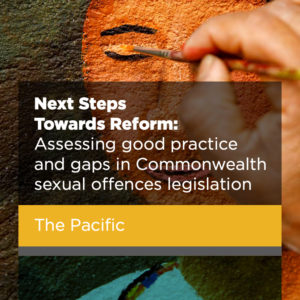Tuvalu’s sexual offences laws are found in the Penal Code 2008 (as amended) (PC). Tuvalu does not have an evidence act. The Constitution of Tuvalu provides that United Kingdom laws of evidence and common law are applicable as part of the existing common law of Tuvalu.
Tuvalu does not have comprehensive legislation to address sexual violence. The most recent reforms were made in 2008, when article 134 of the PC was amended to include the criminalisation of rape of girls under 13 years of age and article 129 which increased the penalty for rape to imprisonment for life.
Most of the sexual assault provisions assessed in this research do not meet good practice. For example, the definition of rape is very narrow and gender specific as it can only be committed by men against women and does not take into account the full range of sexual violations experienced by victim/ survivors, both female and male. The legislation does not define consent to sexual activity as free and voluntary agreement by a person or specify that evidence of resistance to the assault, such as physical injuries to the body, is not necessary to prove that sexual activity took place without consent.
Corroboration of a sexual assault complaint is required and prior sexual conduct of the complainant is admissible without adequate safeguards for the privacy and other rights of a complainant. This is inconsistent with the approach taken in the Family Protection and Domestic Violence Act 2014. Under that Act, corroboration is not necessary, evidence of a complainant’s sexual reputation or previous sexual experience with any person other than the accused is inadmissible, and a complainant does need not prove they resisted the attack to show they did not consent.
Child sexual offences under the PC are not comprehensive and apply only to girls. There is a short statute of limitations of 12 months within which to bring a complaint of unlawful sexual intercourse with a girl between 13-15 years. Tuvalu does not provide close-in-age defences to protect young people from being prosecuted for consensual sexual activity with their peers when one or both is under the age of consent. The age of consent for opposite-sex sexual activity in Tuvalu is 15 years for both boys and unmarried girls. This is too low.
Tuvalu criminalises consensual same-sex sexual activity between males and the PC uses discriminatory and stigmatising language such as ‘unnatural offences’, ‘buggery’ and ‘indecent practices’. Laws that criminalise consensual same- sex sexual activity, such as ‘buggery’ and ‘sodomy’, should be repealed and all non-consensual sexual acts, including ‘anal rape’, should be included in the standard sexual assault provisions, such as ‘rape’ and ‘sexual assault’, as well as in child sexual offences. All of these crimes should be gender-neutral.
Tuvalu is a state party to some relevant international human rights treaties, including the Convention on the Rights of the Child, Convention on the Rights of Persons with Disabilities, Convention on the Elimination of All Forms of Discrimination against Women, and Convention against Torture and Other Cruel, Inhuman or Degrading Treatment or Punishment. Tuvalu is not a party to the International Covenant on Civil and Political Rights.
Read more about the criminalisation of LGBT people in Tuvalu.
The full assessment of Tuvalu is available here.



